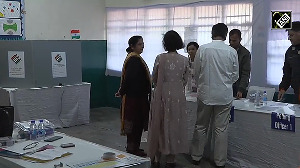The two are the special representatives on the border issue, an office instituted after then prime minister Atal Bihari Vajpayee's visit to China.
Dixit inherited this mantle from his predecessor Brajesh Mishra, who held two rounds of talks with Dai.
Complete coverage: Vajpayee in China
Dai, who arrived in New Delhi on the evening of July 25, will meet Prime Minister Manmohan Singh and Foreign Minister K Natwar Singh before returning to Beijing.
The 'process of settling the border will not be smooth,' Chinese Assistant Foreign Minister Shen Guofang told a group of visiting Indian journalists in Beijing last week. While the talks between Mishra and Dai were 'in-depth discussion on matters of principles,' this round would focus on the 'guiding principles' of a solution formulated during the previous rounds, he said.
But the two nations were sure to uncover many more problems as they delved deeper into the issue, he warned.
However, Beijing was eager to 'to facilitate peaceful negotiations to reach a fair and reasonable solution that is acceptable to both countries on the basis of mutual respect and equality,' he said.
His comments, buttressed by Chinese officials and scholars referring to an imminent deal which could involve some give and take, fuelled media speculation that India may give up its claim to Aksai Chin in return for China giving up its claim on Arunachal Pradesh, along with some minor modifications on the existing boundary line.
Official sources, however, rejected these suggestions as 'base speculation.'
"Yes, we have both agreed to compromise. But now comes the tough part: How much and by whom?" a senior official said.
Dai and Dixit reportedly met for the first time when Dixit, then foreign secretary, accompanied Prime Minister P V Narasimha Rao to China in 1993, and several times subsequently, both formally and informally. "But they still have more than a decade to catch up on," quipped a senior Indian diplomat.
As foreign secretary, and after his retirement, Dixit has been know to articulate a tough but measured stand on China, insisting that that was the only way to garner respect from the northern neighbour.
Dixit was foreign secretary when India signed the Agreement on the Maintenance of Peace and Tranquility along the Line of Actual Control in the India-China Border Areas in September 1993. This stipulated that before the border question between India and China is finally settled, both sides should strictly respect and observe the Line of Actual Control and that each would keep their respective military forces along the Line of Actual Control to the lowest level, in accordance with good-neighborly and friendly relations between the two countries.
Dixit was briefed on India's position at a meeting of the Cabinet Committee on Security chaired by Prime Minister Manmohan Singh on Saturday, where the last two rounds of talks between Dai and Mishra were also reviewed. Others at the meeting included External Affairs Minister K Natwar Singh, Home Minister Shivraj Patil, Defence Minister Pranab Mukherjee, Finance Minister P Chidambaram and General N C Vij, Chief of the Army Staff.
During his visit to China, Vajpayee had formally acknowledged absolute Chinese supremacy over the Autonomous Region of Tibet, while Beijing agreed to open up a trade route through the Nathu La Pass in Sikkim. This, Indian analysts believe, was de facto recognition of Sikkim as an Indian state, something the Chinese did not accept earlier. The subsequent removal of Sikkim as an 'independent nation' from Chinese maps reinforced this belief.
The India-China War, 40 Years On
But irritants in bilateral ties still remain in the form of Chinese suspicions about the Dalai Lama's activities in India and New Delhi's contention that China was arming and assisting Pakistan's nuclear and missile programmes. Added to this is Beijing's reluctance to formally accept India as a nuclear power, and it's continuing insistence that New Delhi sign the Comprehensive Test Ban Treaty.
Senior Indian officials point out that over 15 rounds of talks since the early 1980s on the border issue have failed to yield any breakthrough, and said it would be "naïve" to hope that a "sudden breakthrough" would be achieved with this third round of talks between the two special representatives.






 © 2025
© 2025